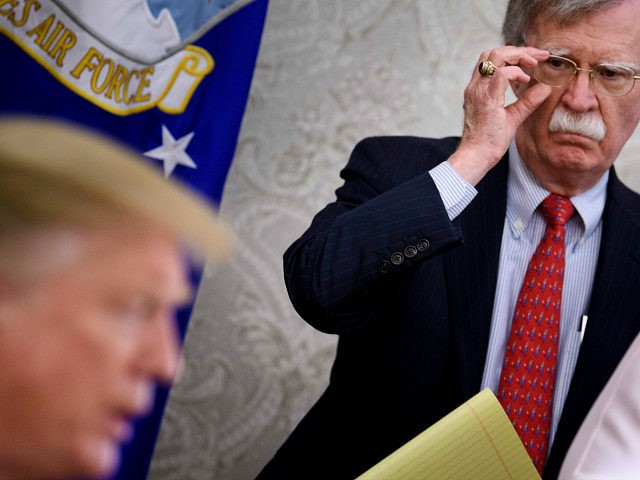National Security Adviser John Bolton said Tuesday that the Trump administration is taking a “hard line” approach to giant technology companies who would compromise American safety for market share in China.
“Whether it’s Apple, Google, or any of the high tech companies, any of the social media companies, they’re so desperate for market share that they’ll do things to compromise our safety here,” John Bolton said at the inaugural National Conservatism Conference in Washington, DC.
“It calls to mind Lenin’s famous remark that the ‘Capitalists will sell us the rope we hang them with.’ And I say to that — ‘Not on our watch,'” he said. “That’s called taking a hard line.”
He also took aim at Chinese telecommunications company Huawei, which has been offering countries all over the world cheap deals to build 5G networks that are expected to revolutionize communications but could jeopardize U.S. security.
“In the case of any of the high tech companies, when they engage in activity that benefits China and potentially harms America … we’re entitled to look at Chinese companies like Huawei and say, ‘You’re not selling in the United States.’
“We don’t want your malign intentions to gain control and access to all of our telecommunications and information technology systems. We’re not going to pretend you’re a real private company engaged in real private competition. You’re a state-owned enterprise doing what your masters in Beijing want you to do,” he said.
Bolton also described the Trump administration’s view on using its economic might against countries seeking to harm or take advantage of the U.S.
“If that means telling somebody we’re not going to trade with Iran because we believe that they are illicitly pursuing nuclear weapons, I think that’s perfectly legitimate for us to do and to extend the range of our economic pressure through sanctions as far as we can, which by the way is exactly what we’re doing with Iran right now,” he said.
He said the U.S. was entitled to protect itself from China’s view of how society functions and the imposition of that view onto American society.
Bolton said that China — a competitor — has taken advantage of the U.S. and the international system for the past several decades, based on a false premise that if China joined the system, it would become more integrated and democratic. He said that premise turned out to be wrong.
“We agreed China should come into the World Trade Organization (WTO) 20 years ago, and I remember the arguments very well,” he said. “I accepted the arguments that China would come into the WTO, the pressure of international norms would force it to change their system, they would behave, they would become more like us, and by the way, they would become more democratic too.”
“Neither of those things have happened,” he said. “The Chinese played the WTO like a fiddle for 20 years. They’ve taken advantage of us and everyone else in it. Contrary to the argument that a more prosperous China will become a more democratic China, the opposite has happened. We now have Xi Jinping, the most authoritarian Chinese ruler since Mao Zedong.”
“We see very hostile activity by China on a range of military fronts, in the East China Sea, the South China Sea. We see a tremendous build-up of their nuclear and ballistic missile and blue-water navy capabilities, and we see a very determined form of mercantilistic economic policy internationally, and I think it’s on that front that the president has particularly confronted China,” he said.
He said the U.S. imposed tariffs on China in order to seek changes to “structural issues” such as the “massive, persistent theft, of American intellectual property by China, forced technology transfers, discrimination against American businesses and investors.”
“We don’t know the outcome. Maybe the Chinese system will change, maybe they’ll undergo these structural changes we’ve been asking for, maybe not. That’s what’s in the balance now,” he said.
He demurred on whether the U.S. was approaching a “Cold War” with China but said there are “elements of Samuel Huntington’s clash of civilizations” — the historian’s theory that conflict would eventually come, not between nations, but between cultures.
“Ultimately, national, political, and military power and its projection around the world rests on economic power. And when one country is abusing the rules of the international trading system for its own advantage, particularly taking advantage of the United States, that should stop,” Bolton said.
“That is what President Trump is challenging,” he added.

COMMENTS
Please let us know if you're having issues with commenting.